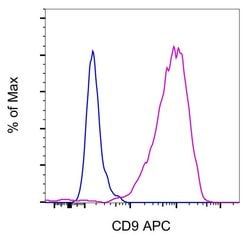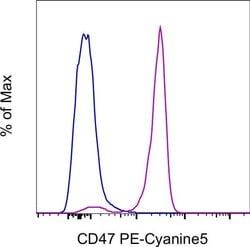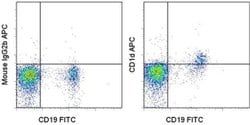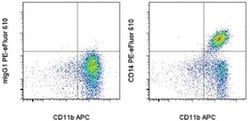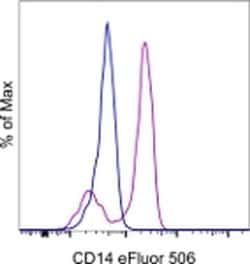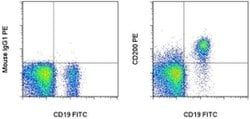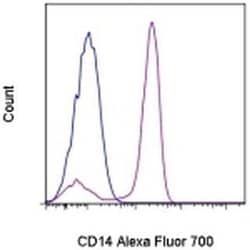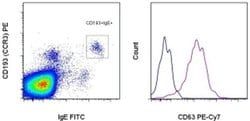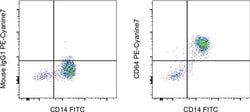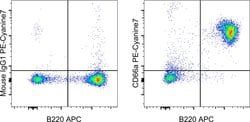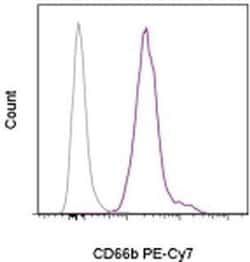CD63 Monoclonal Antibody (H5C6), PE-Cyanine7, eBioscience™, Invitrogen™
Manufacturer: Invitrogen
Select a Size
| Pack Size | SKU | Availability | Price |
|---|---|---|---|
| Each of 1 | 25-063-942-Each-of-1 | In Stock | ₹ 35,066.00 |
25-063-942 - Each of 1
In Stock
Quantity
1
Base Price: ₹ 35,066.00
GST (18%): ₹ 6,311.88
Total Price: ₹ 41,377.88
Antigen
CD63
Classification
Monoclonal
Concentration
5 μL/Test
Formulation
PBS with 0.2% BSA and 0.09% sodium azide; pH 7.2
Gene Accession No.
P08962
Gene Symbols
CD63
Purification Method
Affinity chromatography
Regulatory Status
RUO
Gene ID (Entrez)
967
Content And Storage
4° C, store in dark, DO NOT FREEZE!
Form
Liquid
Applications
Flow Cytometry
Clone
H5C6
Conjugate
PE-Cyanine7
Gene
CD63
Gene Alias
C75951; CD 63; Cd63; CD63 antigen; CD63 antigen (melanoma 1 antigen); Cd63 molecule; CD63 protein; granulophysin; LAMP-3; Lysosomal-associated membrane protein 3; lysosome-associated membrane glycoprotein 3; mast cell antigen AD1; ME491; melanoma 1 antigen; melanoma-associated antigen ME491; melanoma-associated antigen MLA1; MLA1; Ocular melanoma-associated antigen; OMA81H; Tetraspanin-30; TSPAN30; tspan-30
Host Species
Mouse
Quantity
100 Tests
Primary or Secondary
Primary
Target Species
Human
Product Type
Antibody
Isotype
IgG1 κ
Description
- This H5C6 MAb reacts with human CD63, a type III member of the tetraspanin family of transmembrane proteins
- CD63 is expressed intracellularly on lysosomes, endosomes, and granules of resting platelets and basophils
- However, cell surface expression of CD63 can be detected on activated basophils and platelets, monocytes, macrophages, and granulocytes
- This receptor is also expressed on endothelial cells, fibroblasts, and smooth muscle cells
- Studies have demonstrated that CD63 associates with integrins (VLA-3 and VLA-6) and TIMP-1 to mediate the allergic response
- CD63 (LAMP-3, lysosome-associated membrane protein-3), a glycoprotein of tetraspanin family, is present in late endosomes, lysosomes and secretory vesicles of various cell types
- CD63 is also present in the plasma membrane, usually following cell activation
- Hence, CD63 has become a widely used basophil activation marker
- In mast cells, however, CD63 exposition does not need their activation
- CD63 interacts with integrins and affects phagocytosis and cell migration, it is also involved in H/K-ATPase trafficking regulation of ROMK1 channels
- CD63 also serves as a T-cell costimulation molecule
- Expression of CD63 can be used for predicting the prognosis in earlier stages of carcinomas
- CD63 is expressed on activated platelets, and is a lysosomal membrane glycoprotein that is translocated to plasma membrane after platelet activation
- CD63 is also present in monocytes and macrophages and is weakly expressed on granulocytes, B, and T cells
- CD63 is identical to the melanoma-associated antigen which is ME491 and to the platelet antigen PTLGP40
- Diseases associated with CD63 dysfunction include melanoma and Hermansky-Pudlak Syndrome.

